Please Note: This post is about a salmonella outbreak that occurred in several parts of the United States in winter and spring 2021. While that outbreak has passed, cleaning and disinfecting your feeders is always a good practice.
I’ve lived next to the same retired couple for 20 years. They’re kind with words and consistent with seed. Their place is breakfast for the birds. My place is the bathroom. I saw my first Steller’s jay on our shared wood-slat fence last spring. Exciting. But I’ve cleaned up bird poop for 20 years. Not exciting. I’m regularly hosing down my backyard because my neighbors keep a full bird feeder in their front yard.
Well, they did until this year. I walked the block last night. Their bird feeder is empty and cleaner than I’ve ever seen it. As it should be.
Eastern Idaho, where I live, is in the middle of a salmonella outbreak. It’s not a localized occurrence. Birds across the West are sick and spreading the illness as they congregate then migrate. Cases are coming in from Washington to Utah and to the east, North Carolina is having trouble too.
While bird feeding is experiencing a pandemic boom in popularity, feeding birds at this moment is having dire consequences. Birds are dying in no small part due to bird feeding.
You can still enjoy birds. But it’s time to remove seed and take down the feeders.
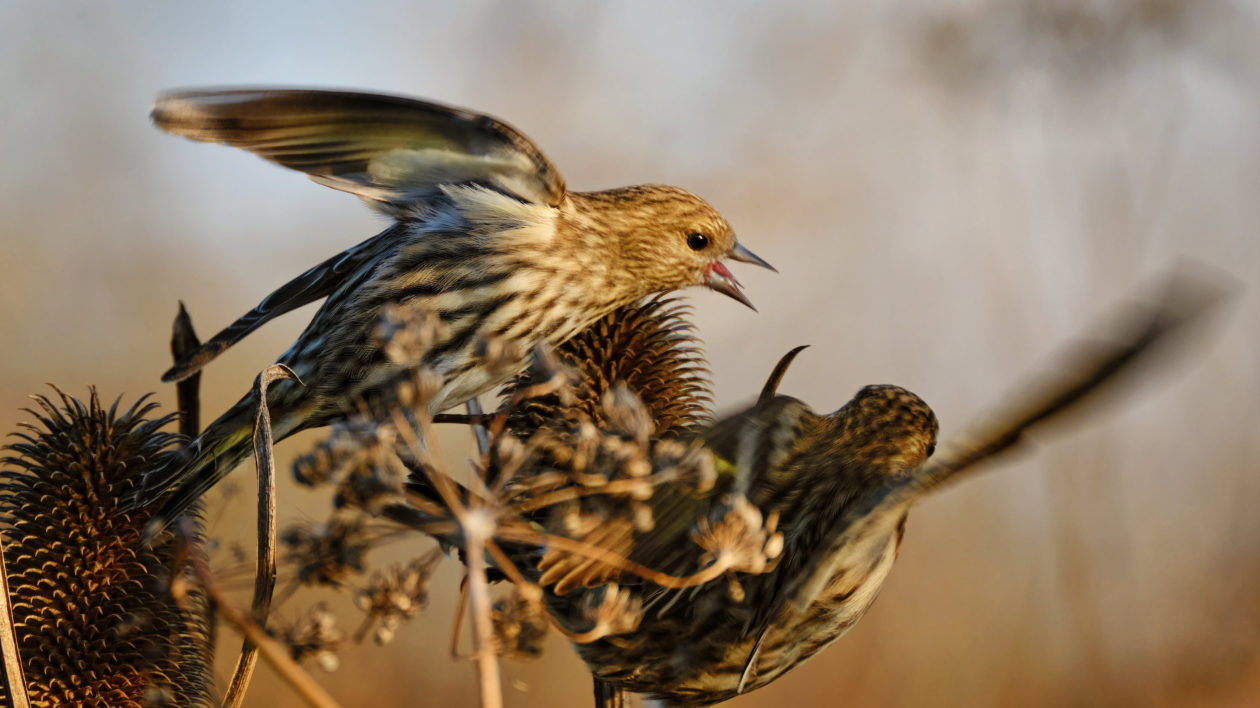
Outbreak
Songbirds are prone to salmonellosis, commonly called salmonella. Pine siskins are songbirds and they experienced an irruption over the winter. That’s a population explosion so there’s a lot of them flitting about this winter. Many of them are sick.
“This is the biggest outbreak I’ve heard of and I’ve been following birds for 25 years,” says Nicole Michel, National Audubon Society director of quantitative science. “It all ties into pine seed crops in the boreal regions where they usually are. There weren’t enough seeds so they came south. They’re weak because they’ve traveled farther than they’re used to and they’re congregating wherever they can eat.”
Salmonella starts when bird food gets wet. That’s how the bacteria grows on seed then it spreads through feces dropped in the same place. Salmonella is a fatal bacterial infection for birds and it’s hitting siskins hard because they congregate around feeders, but the outbreak isn’t species-specific. Anything eating seed in your yard, resident or migrator, can spread or contract salmonella. The three Ds of symptoms include ‘depressed, drowsy and diarrhea.’ Depression won’t be obvious in wildlife, but drowsy will. Infected birds close their eyes often and they puff up, like they do in cold weather, but they’re not cold. They’re sick.
California started seeing more cases in December. Other states are seeing an uptick this spring as the bacteria continues to spread, which is why more state agencies are asking people to remove their bird feeders.
“When large numbers of pine siskins congregate, the disease can spread rapidly causing high mortality,” says Krysta Rogers, California Department of Fish and Wildlife senior environment scientist and avian disease specialist. “Most birds die within 24 hours of infection.”
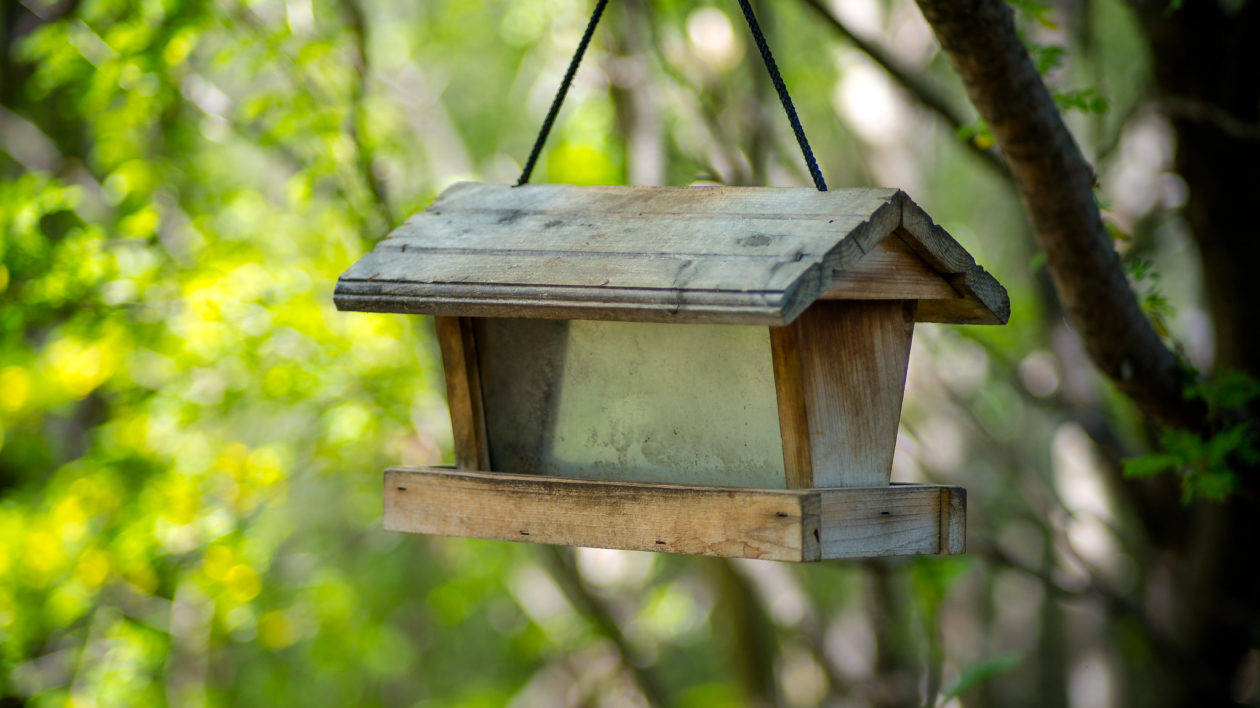
Clean Your Feeders
What those birds leave behind, feces and germs, lingers and it comes in contact with anything else enticed to perch nearby. That’s why you have to clean.
Clean feeders once a week with warm soapy water in normal years. Clean them several times a week during salmonella years like the one we’re in now. Better yet, clean it with one part bleach to 10 parts water.
Soak the whole thing in that solution for about 10 minutes then air dry the container while you remove spent grain and other waste from the area around and under the feeder hanger. Put on gloves before you clean and wash your hands after handling equipment or collecting dead birds.
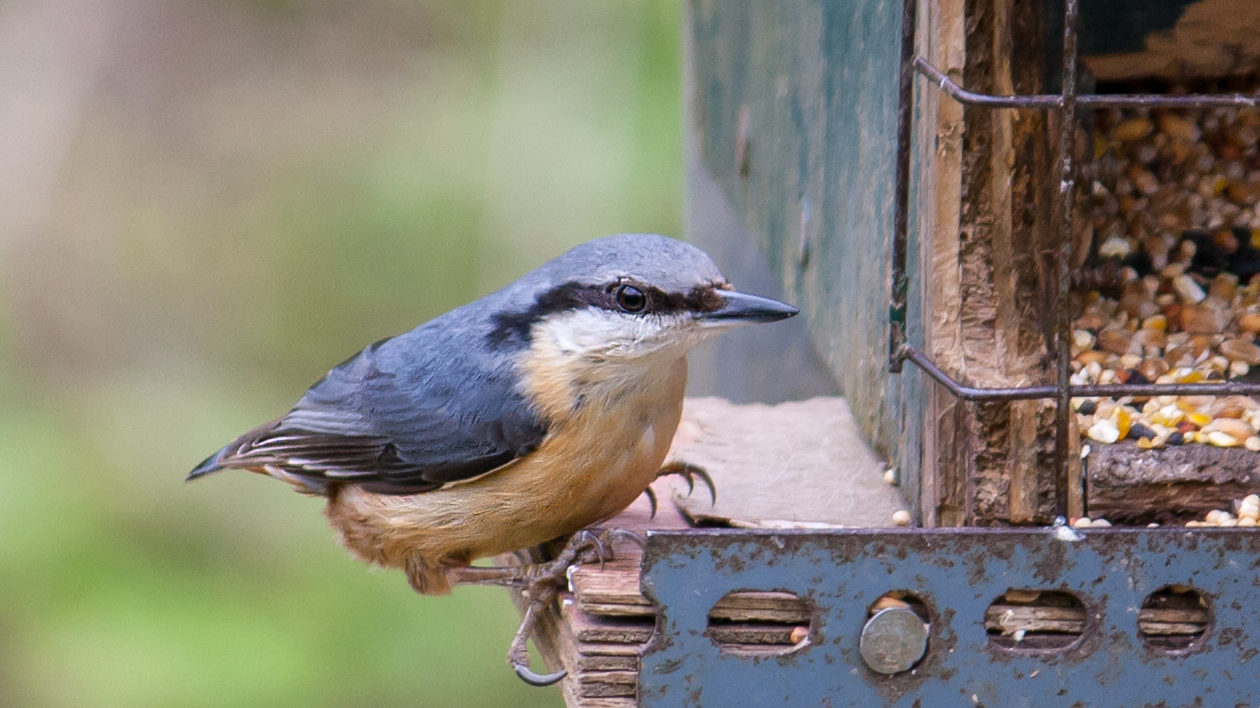
Encourage Avian Social Distancing
Especially this year, don’t stop at cleaning. Put your feeder away for a month. Michel, based in Portland, Oregon pulled her feeder for two months. If you must rehang your cleaned feeder, hang it empty.
“There’s a lot of other food sources they can still find,” Michel says. “The risk of death by starvation is lower than the risk of death by salmonella if you keep a contaminated feeder up.”
It’s the concentration of birds in one place that spreads the problem, but they won’t hang around if there are no hand-outs. The birds need to social distance to save themselves. And not to worry, they won’t starve without your supply.
“Although stopping feeding may seem like it will harm birds, in reality, they use feeders as just one source of food and will quickly disperse to find other food sources and in so doing, reduce transmission of this disease at feeding sites,” says Tempe Regan, Idaho Department of Fish and Game regional diversity biologist. “Sanitation is critical and it is your responsibility to ensure your feeders are not facilitating disease transmission.”
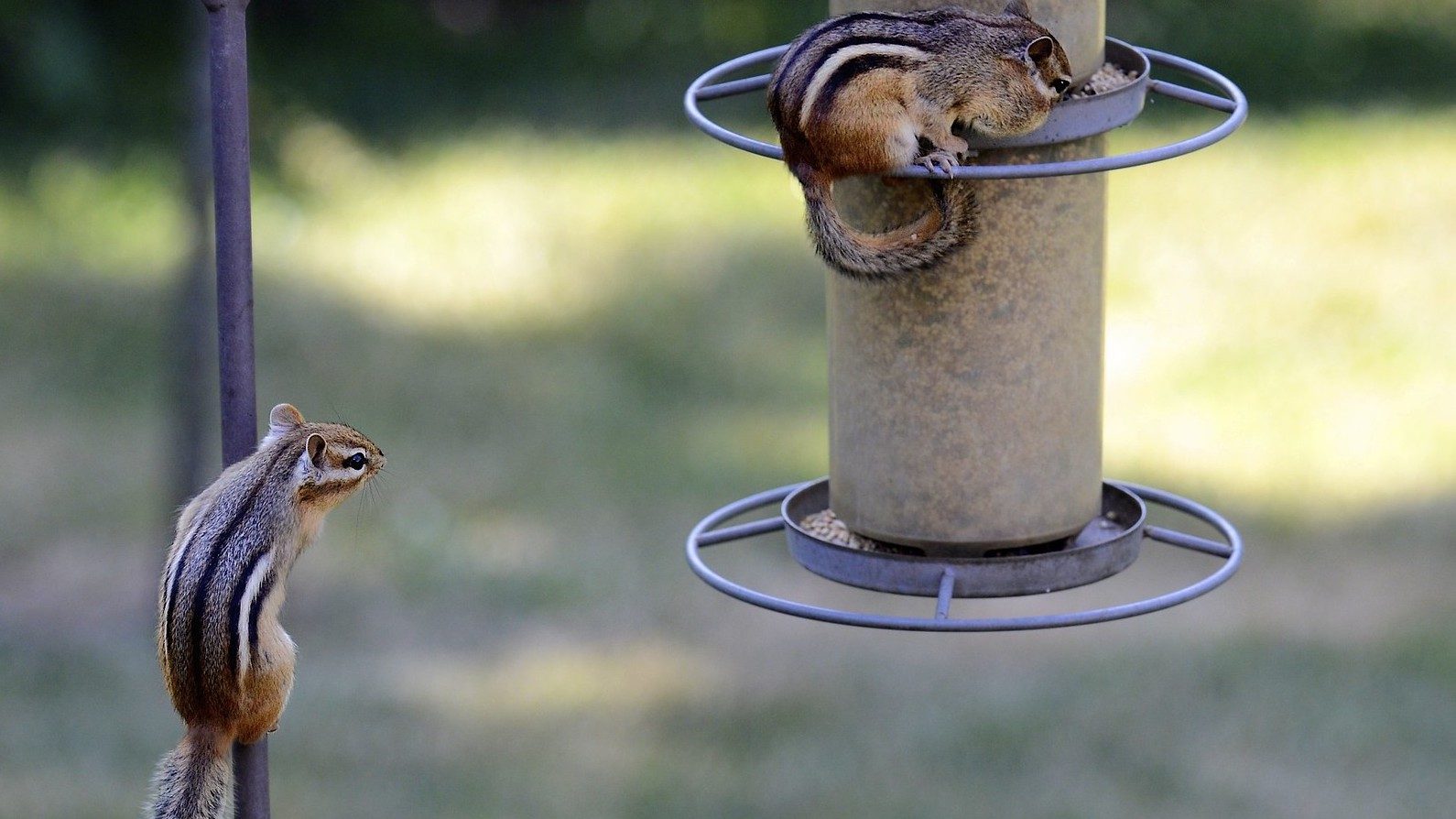
Dogs & Cats
Disease transmission to humans is possible. In mammals, the symptoms are more like food poisoning, but pets are a bigger concern especially. The drowsy symptom mentioned above may cause a bird to stay on the ground when approached. Obviously, the same is true if it dies. That’s an easy meal for a predator allowing the disease to spread to and/or through your furry family member. Keep dogs and cats out of hunt mode in your neighborhood this spring. (And better yet, don’t allow your pets to roam freely and hunt wildlife, ever).
Refraining from feeding birds can be a bummer, especially those new to the birding hobby. But you can still watch what’s moving through without feeding it. The birds are still around. If you have a yard, you may want to consider incorporating natural landscaping that provides habitat without concentrating birds.
Backyard birding has become so popular that is has fueled a seed shortage. But now is not the time to search for seed. Keep the binoculars and field guides handy. For the time being, though, forego the feeding to help the birds you love.
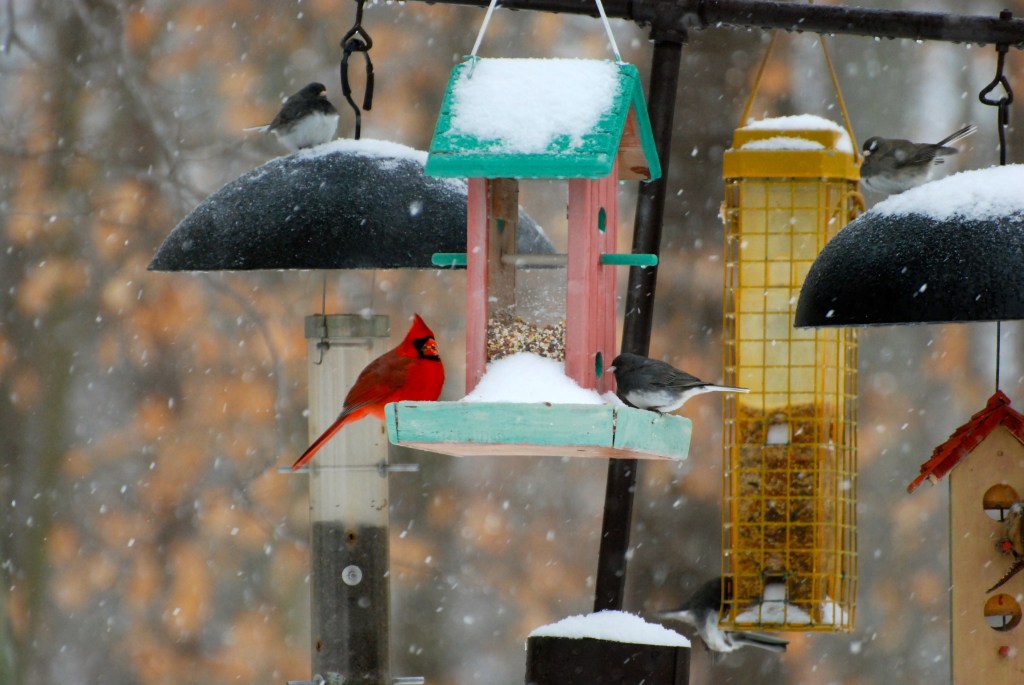



Thank you
I cleaned mine well in the spring. Then I quit when I heard about dying birds. I figured it was salmonella right away.
If we clean the feeders up can we resume to feeding them again?
It is safe to resume feeding now. But it is always good practice to clean your feeders.
Best,
Matt
I took feeder down and the finches keep coming to my sliding door to complain. If finches have cow eye, lol, mine do. I finally took a cup of black sunflower seed mix and tossed it in a large area. Half of it is gone already. By night time I will sweep what is left up. My birds really appear to be hungry. They’ve been coming to my door for weeks knowing I kept my feeder full. I figured the would eventually give up but they did not. The rain storms will be here fir the night in 3 hours. They want to eat. I really hope I am not endangering them but I believe they are already spoiled on the feeder or at the very least free seed.
Any safe tips on feeding I’m up for for sure. I really love my birds.
Should we stop feeding hummingbirds as well?
The salmonella outbreak that was present in many parts of the country in early spring has passed so it is safe to feed birds. However, it is ALWAYS important to clean feeders regularly (including hummingbird feeders).
Can squirrels contact samonella and die? I found 4 dead in my yard. I live in Jacksonville, Floida
Birdfeeders can inadvertently cause the death of many birds for other reasons. The birds invariably knock seed to the ground as they flick the seed around to find their favorite morsels. Some may then drop down to the ground to forage for the scattered seeds. That is when any feral or domestic cats in the area may spot them and pounce on them.
I saw our dogs playing with a Grosbeak yesterday May 7th 2021 and managed to get them to leave it alone. The bird then sat on the ground and made no attempt to fly away. I thought it odd, I then saw the bird on my truck and watched as it attempted to fly and couldn’t. He wobbled and flopped in the air, I was close by and reached out and caught him just as he plummeted from the air into my hands. I took him to a tree and set him on a branch. A short time later found him on the ground again, we have several dogs and I knew the bird would not be safe, so I walked him out to the back of our property behind a fence they dogs can’t get through. It wasn’t long and I found the bird in our yard again. I put him in a pet carrier and began searching for someone in our area to take and care for the bird as I noticed his eye’s were closed and one was really a mess. This led me to our local Audubon Society and in talking with them they informed me about this disease and that the bird most likely was infected. I had no idea, I took the little creature to a local Vet that will rehab him if possible. I suspect he won’t make it, please do not disregard the information and at least for a short time take down your feeder’s. I am now watching my dogs for symptoms and I handled the bird not knowing about any of this. So I too may have become infected, time will tell…
I live in Los Angeles, California. I have been feeding and enjoying the birds from my terrace for several months.
All my singing birds seem just fine. There are no signs of illness detected at all. Now I am very concerned about the salmonella infection. I also get regular visit from a squirre the same one. And he/she seems just fine also.
Should I really take the feeder down? If so, for how long? I’m a member of an Audubon Society and monthly donner.
Hi Misa,
Thanks for your question. I would check with your local Audubon staff or state wildlife agency. The salmonella outbreak was pronounced in winter and early spring, but it is difficult to know where it is still present. I’d look into it locally and make a decision based on that.
Best,
Matt
I don’t know if cicadas will arise in every region but I know they will be swarming here in KY. All birds here will get plenty to eat for at least a month or two and get to social distance while getting their belly full.
I never give birds wild bird food. They’re already wild.
I live in Minnesota, and have taken to cleaning my bird baths and feeder every two weeks. No evidence of ill or sick birds to this point. Is there data regarding salmonella in birds in MN?
Hi Wendy,
This outbreak occurred in the western United States, but birds do move around. I would check with your state wildlife agency.
Matt
Perhaps only scatter bird seed feed on the ground or a high surface like a flat roof,this will still feed the birds and avoid the need for feeders, it won’t stop the squirrels but will give the birds a chance to survive
We live in AZ. Backyard bird watching has changed our lives for the better, esp during the pandemic. However, we would NEVER do anything to hurt any of the wildlife. I’m wondering if dry drought here would prevent salmonella. I will wash the feeder regularly.
Thank you. This was very helpful. It is heartbreaking that salmonella is further decimating our beloved bird population. I’m taking my feeder down and cleaning up the seeds on the ground first thing in the morning.